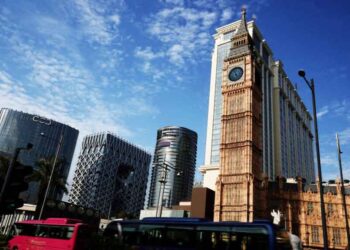By Kate O’Keefe, Dow Jones Newswires
The Macau government’s decision in May to grant Wynn Resorts Ltd. land rights for a $4 billion casino-resort has paved the way for what Chairman Steve Wynn has called “the single most important project” in the company’s history.
The decision also has triggered a $50 million payment by Wynn Resorts to a little-known Macau company as part of a complex deal whose seven-year history has involved the Chinese territory’s former top official, his close associate and a businessman from a prominent Beijing family, according to public records, Wynn executives and company documents reviewed by The Wall Street Journal.
The deal’s history and the connections among the companies and people involved open a window on business dealings in the booming Chinese gambling enclave of Macau, which generates more than five times as much gambling revenue as the Las Vegas Strip.
To expand in Macau, U.S. casino operators have had to grapple with a complicated and opaque government approval process. On occasion, those efforts have drawn U.S. government scrutiny. Wynn said in February that the Securities and Exchange Commission was investigating a pledge it made last year to donate $135 million to the University of Macau. The company said the donation was made in accordance with all applicable laws and was consistent with the company’s tradition of philanthropy. The university’s top academic official said Wynn’s gift will support activities at the school’s Asia-Pacific Academy of Economics and Management.
Meanwhile, Wynn rival Las Vegas Sands has said it is under investigation by both the SEC and the Justice Department for possible violations of the Foreign Corrupt Practices Act, which bans bribery by U.S. companies abroad. Las Vegas Sands says it is cooperating with investigators.
Macau land deals also are facing scrutiny at home. In late May, the Chinese territory’s top court found a former top government official guilty of helping a Hong Kong property mogul win land rights in return for a $2.5 million bribe in 2005.
In a lengthy lunch interview at Wynn Macau’s Cafe Esplanada last month, Mr. Wynn, flanked by two senior lawyers, two Wynn Macau Ltd. board members, two bodyguards and his wife, said that it was Edmund Ho, Macau’s former top official, who sparked the land-deal discussions. Edmund Ho was the first chief executive of Macau after Portugal handed it over to China in 1999, and he held the post for a decade.
Mr. Wynn said he had been “bugging” the city’s leader about getting land in the space-starved territory for another casino project. Edmund Ho told him about a plot that had been earmarked for a person named Ho Ho, Mr. Wynn said, and provided Ho Ho’s phone number to a Wynn staff member, who set up a meeting in Wynn’s Macau offices. A Wynn lawyer said the company doesn’t believe the Messrs. Ho are related.
According to a document dated Aug. 25, 2005, and signed by Stephen A. Wynn and Ho Ho, Wynn Resorts agreed to jointly pursue rights to the site in Macau’s Cotai area with a company controlled by Ho Ho. The company, called Cia. de Entretenimento e Investimento Chinese Limitada, is 90% owned by Ho Ho, with prominent Macau businessman Cliff Cheong owning the rest, according to Macau public records. Both men list Mr. Cheong’s office as their residential address in Macau.
While Ho Ho is little-known in Macau, Mr. Cheong has close connections to one of the city’s most powerful people, Edmund Ho.
A representative for Mr. Cheong, who is involved in the junket business, said he wasn’t available to comment. Junkets are middlemen who bring Chinese gamblers to Macau and account for three-quarters of the city’s gambling revenue.
Mr. Cheong’s relationship with Edmund Ho was outlined in a lawsuit that he and two associates filed against Las Vegas Sands. The suit alleged that Mr. Cheong and his associates were owed money for helping Las Vegas Sands win a casino license in Macau. The casino company paid the three men $42.5 million to settle the suit in June 2009, according to its 2009 annual report.
In the suit in Clark County District Court in Nevada, Mr. Cheong testified that he served as a key liaison between Macau’s chief executive and Las Vegas Sands during the final hours of the casino-license bidding in 2002.
One of Mr. Cheong’s associates in the suit, Dax Turok, told the court that Mr. Cheong “had his finger on the pulse all the time” on Macau policy because of his close relationship with Edmund Ho. Mr. Cheong was also a member of the advisory committee on the handover of Macau to China, Mr. Turok said.
Mr. Wynn told the Journal that he has never heard of Mr. Cheong. He also said his company vetted Ho Ho and his associates thoroughly because he and other executives were very aware of the Foreign Corrupt Practices Act.
“This whole business of the Foreign Corrupt Practices Act—we were schooled in this,” Mr. Wynn said. “Right away we started checking everybody with Mr. Ho Ho, and everybody came up dandy.” He also said that he is confident none of the people involved in the deal were government officials. “Edmund told me they are upstanding people from Beijing families,” Mr. Wynn said, declining to elaborate further. The company hasn’t been accused of wrongdoing in the Macau deal.
The Journal was unable to locate records showing the land was ever owned by Ho Ho. Wynn Resorts’ contract for the land shows Wynn as the first official owner of the plot. Ho Ho, whose given name means river in Chinese, couldn’t be located.
A representative for Edmund Ho, who is now vice chairman of the Chinese People’s Political Consultative Conference, China’s top political advisory body, declined to comment.
In May 2006, Wynn and its partners established a joint venture called Cotai Land Development Co., according to Macau public records. Mr. Wynn, Marc Schorr, the casino company’s chief operating officer, and Ho Ho were the company’s three directors. Under the arrangements, according to a company document reviewed by the Journal, Wynn Resorts would pay another company controlled by Ho Ho $35 million as a “one-time finder’s fee” when the venture secured land rights for the casino from the government.
Two years later, as the global economic crisis brewed and China cut back visas allowing its citizens to visit Macau, Wynn Resorts sought to dissolve the agreement, Mr. Wynn said. As an inducement for its partners, Wynn agreed to pay an additional $15 million to Ho Ho and his associates to walk away once Wynn got the land rights, according to Mr. Wynn and a company document reviewed by the Journal.
Wynn disclosed the deal in a September 2009 statement to the SEC in which the company said it had agreed to pay $50 million to its partner for the “relinquishment of certain rights with respect to its business interests.”
The SEC filing identified a Macau company called Tien Chiao Entertainment Ltd. as Wynn’s partner. Though neither Ho Ho’s nor Cliff Cheong’s name is mentioned in the public records for the company, Wynn lawyers and corporate documents indicate that Ho Ho controls Tien Chiao, whose shareholders are listed as Ho Ho’s brother and a man with a business registered at Mr. Cheong’s office.
In later disclosures, Wynn said the $50 million payment would go to a third party unrelated to Wynn.
Macau’s Department of Public Works, which granted the land to Wynn, declined to comment.
Mr. Wynn said he also got Macau to agree to give him a contiguous plot of land instead of the plot initially under discussion, which was divided by a road. Mr. Wynn said he had earlier been troubled by this layout: “How are we gonna do something sexy with a street going through the middle?” he remarked.
—Alexandra Berzon contributed to this article.



































